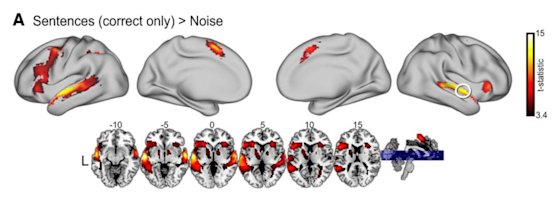Overview
Everyone has subtle differences in their hearing acuity. This study examines how subtle, clinically normal differences affect the brain systems involved in speech processing. Participants with normal hearing completed a task involving listening to spoken sentences concurrent with receiving functional magnetic resonance imaging (fMRI). Imaging revealed individuals who had poorer hearing (although still within normal limits) demonstrated greater activation of their attention networks, in addition to the normal activation of the auditory networks, when successfully understanding the spoken sentences. This study suggests that even slight variations in hearing acuity impact the brain systems required to accurately understand speech, requiring greater coordination of auditory and attention networks to meet the demands of the auditory stimuli. This study has been featured in several news and media articles including US News & World Report.
Figure 2A displays increased activity (fMRI) in language regions of the brain when listening to sentences versus noise, followed by the correct behavioral response in the experimental task.


